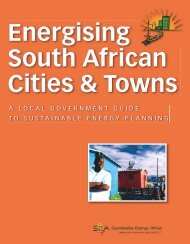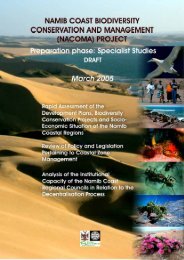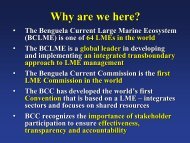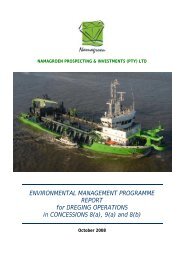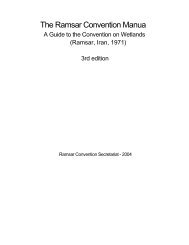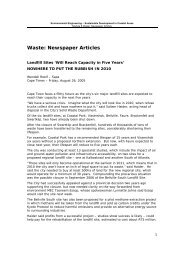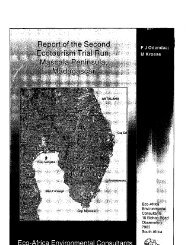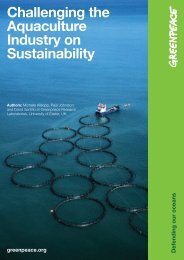Feasibility Study of Proposed Tourism Dev in Shewula, NE ...
Feasibility Study of Proposed Tourism Dev in Shewula, NE ...
Feasibility Study of Proposed Tourism Dev in Shewula, NE ...
You also want an ePaper? Increase the reach of your titles
YUMPU automatically turns print PDFs into web optimized ePapers that Google loves.
Chapter 7 - Conclusions<br />
There is a general lack <strong>of</strong> awareness and/or understand<strong>in</strong>g regard<strong>in</strong>g the processes<br />
that have been undertaken to establish the project, the reasons for the project, the<br />
nature <strong>of</strong> the tourism <strong>in</strong>dustry, and the possible benefits as well as the possible costs<br />
<strong>of</strong> <strong>in</strong>troduc<strong>in</strong>g tourism to <strong>Shewula</strong>. There is also a degree <strong>of</strong> uncerta<strong>in</strong>ty regard<strong>in</strong>g the<br />
specifics <strong>of</strong> the development, such as how the tourism development could / should<br />
operate, and hence an apprehension / suspicion regard<strong>in</strong>g the benefits <strong>of</strong> such<br />
development for the community.<br />
b) Lack <strong>of</strong> participation<br />
The lack <strong>of</strong> participation and lack <strong>of</strong> motivation to participate <strong>in</strong> the various stages <strong>of</strong><br />
the project, is associated with a lack <strong>of</strong> broad-based support for the project among the<br />
general community members. There is, however, some qualified support for the<br />
project, but it rema<strong>in</strong>s dependent on the proven success <strong>of</strong> the project. The concerns<br />
raised dur<strong>in</strong>g <strong>in</strong>teraction with the community about the possibility <strong>of</strong> hav<strong>in</strong>g their land<br />
taken away, and <strong>of</strong> corruption <strong>in</strong> the <strong>in</strong>stitutional body that would manage the<br />
projects, reflect the fact that the general community does not feel a sense <strong>of</strong><br />
ownership about the project.<br />
c) Lack <strong>of</strong> <strong>in</strong>formation.<br />
The above-mentioned limitations stem, <strong>in</strong> part, from the situation described <strong>in</strong> section<br />
7.1.2, namely lack <strong>of</strong> access to <strong>in</strong>formation. The community's ignorance regard<strong>in</strong>g the<br />
content <strong>of</strong> the proposal and the processes that have resulted <strong>in</strong> the project's <strong>in</strong>itiation,<br />
have contributed to both a lack <strong>of</strong> understand<strong>in</strong>g and misunderstand<strong>in</strong>gs about the<br />
proposed development. This has, <strong>in</strong> turn, been accompanied by a lack <strong>of</strong> enthusiasm<br />
to become <strong>in</strong>volved <strong>in</strong> the project, a limitation further impeded by the process-related<br />
limitations <strong>of</strong> an non-participatory plann<strong>in</strong>g approach.<br />
7.1.4.2. Strengths and Opportunities<br />
Despite the above-mentioned limitations, there is tremendous potential for these<br />
constra<strong>in</strong>ts to be addressed. There is a desire on the part <strong>of</strong> the community to<br />
participate more fully <strong>in</strong> the plann<strong>in</strong>g <strong>of</strong> the project, and to be kept <strong>in</strong>formed <strong>of</strong> its<br />
progress. There is also a degree <strong>of</strong> will<strong>in</strong>gness, on the part <strong>of</strong> some community<br />
members, to make sacrifices (especially <strong>in</strong> the form <strong>of</strong> time spent plann<strong>in</strong>g for it).<br />
There was also <strong>in</strong>terest expressed <strong>in</strong> utilis<strong>in</strong>g the opportunities for associated<br />
bus<strong>in</strong>ess development and tourism activities that could result from / be associated<br />
with the tourism development.<br />
- The formation <strong>of</strong> a Community Trust is also a positive factor that could serve to<br />
strengthen the project. Many <strong>of</strong> the decisions that still have to be made before the<br />
project's ultimate implementation could be taken by this trust.<br />
7.1.5. Additional constra<strong>in</strong>ts to the project<br />
Apart from the above-mentioned weaknesses, threats, limitations and/or obstacles to<br />
the project, there exist a number <strong>of</strong> factors which are not directly related to the<br />
project, which could nevertheless significantly <strong>in</strong>fluence the project's feasibility. These<br />
are further discussed below.<br />
The existence <strong>of</strong> several checkpo<strong>in</strong>ts that tourists would be obliged to make en route<br />
to and from <strong>Shewula</strong>, poses a significant threat to the tourism experience that would<br />
be encountered by tourists travell<strong>in</strong>g from Maphiveni, along the road to Lomahasha,<br />
and <strong>in</strong>to <strong>Shewula</strong>. This is <strong>of</strong> particular importance with regard to the sense <strong>of</strong> security




